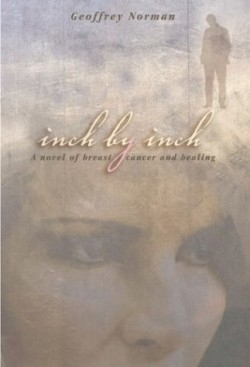Inch by Inch
A Novel of Breast Cancer and Healing
“Each pass of the clippers left another exposed trail of pale, white scalp, and as I watched, my memory dredged up old images from pictures I’d seen in some magazine of the French women who had taken German soldiers for lovers.” Jack, the main character in the novel, acknowledges that this vision of his wife shearing her treasured locks is “simultaneously petty and cruel,” and readers feel as helpless as Jack to help this victim through her unwelcome journey through breast cancer. The novel transcends Jack’s passage “inch by inch,” as his wife, Leslie, finds herself facing surgery, chemotherapy, radiation, and the emotions that affect her and her family’s lives.
Reading this book is like paying attention to that voice that plays behind everyday actions. It enables the reader to experience cancer through a partner’s eyes. The reader empathizes as Jack turns this challenge into an opportunity for discovery, for living in the moment, and for identifying purpose behind those moments.
Jack is an aging executive at a company going through “reorganization” with a non-empathetic boss. Cancer infects his family’s lives, while consultants (he calls them “ghouls”) hover at his workplace, looking for “efficiencies.” At the same time that his wife’s life is threatened, so is his job, which adds to his feelings of helplessness.
Jack also shares the experience of the “empty nest” syndrome that couples endure when their children leave home. His oldest son, Brad, and younger daughter, Andy, reveal facets of character that Jack was unaware of, strengths that surface in their adverse venture. Leslie chooses when and what to share with her family about her condition, which is understandably difficult for them to accept. Jack, her soul mate, allows her to captain the ship, despite the family’s well-intentioned, although mutinous, desires. Jack admires Leslie’s control, but the reader may see her as too controlling, and may wish that Jack could express his own pain and helplessness. Norman, who has written six novels and four nonfiction books, and is currently editor of Forbes FYI, allows Jack to communicate some selfish thoughts; however, they are so few that the reader may challenge their honesty.
Jack does dare to put a voice to those emotions normally shuffled aside due to their inconsequence in the scheme of things. By doing so, he demonstrates that cancer victimizes more than the body: vulnerabilities extend to families and friends, and through these frailties, one can find endurance, and a reason, to go on. Henry Thoreau once said, “When you find the dog is chasing you, turn around and whistle for it.” Jack’s family whistles, and the dog settles down.
Reviewed by
Diane Lundin
Disclosure: This article is not an endorsement, but a review. The publisher of this book provided free copies of the book to have their book reviewed by a professional reviewer. No fee was paid by the publisher for this review. Foreword Reviews only recommends books that we love. Foreword Magazine, Inc. is disclosing this in accordance with the Federal Trade Commission’s 16 CFR, Part 255.

